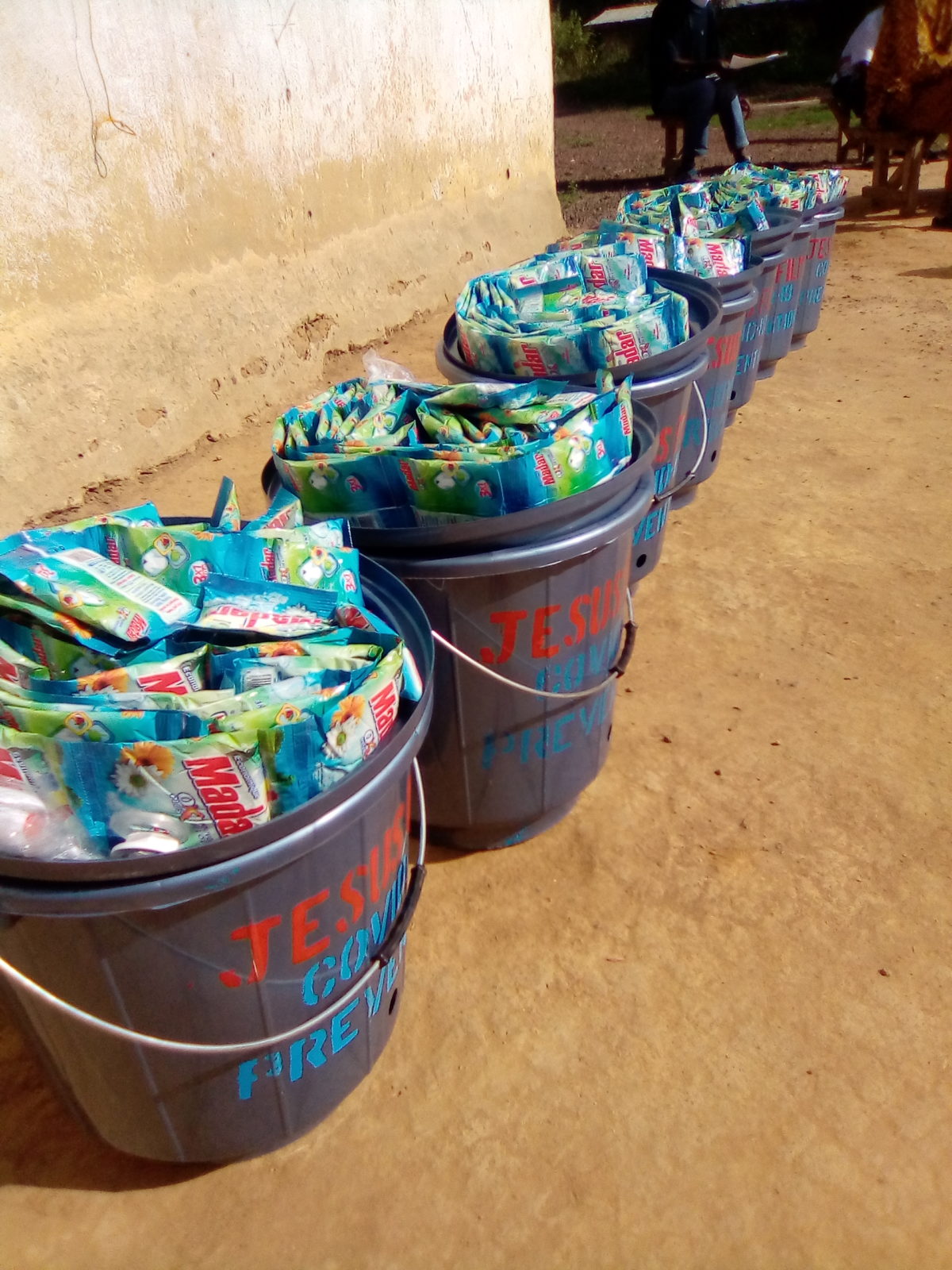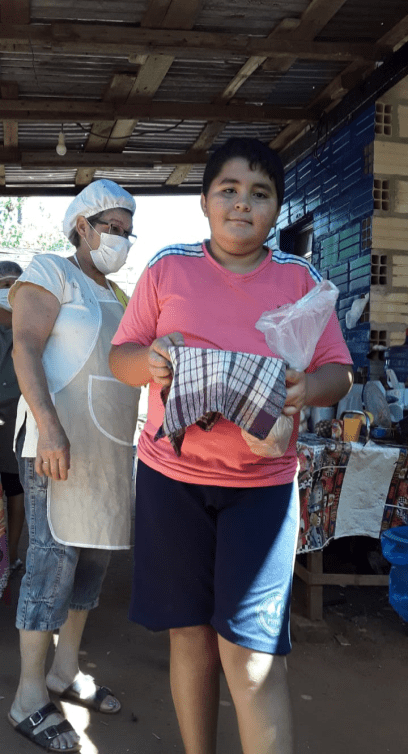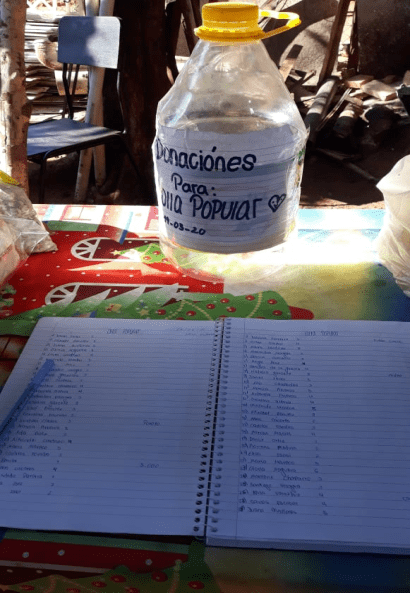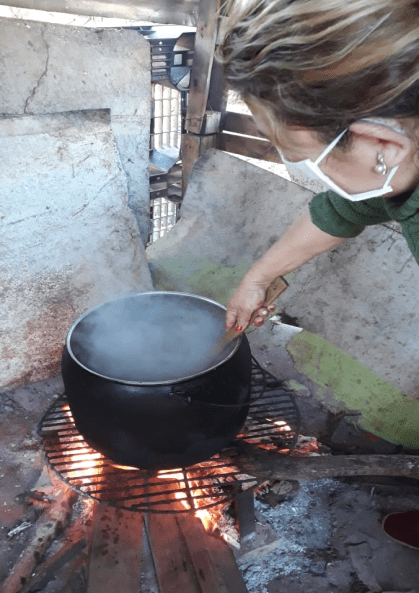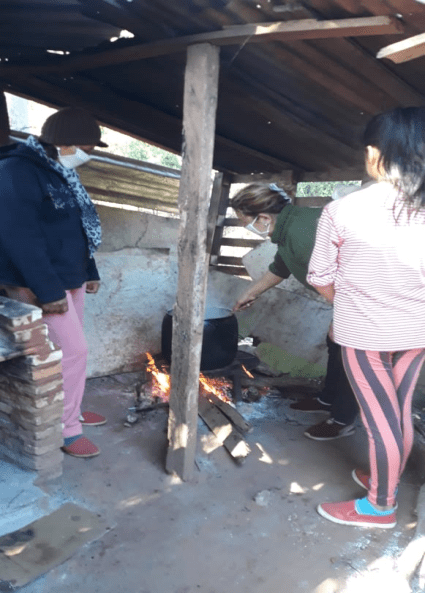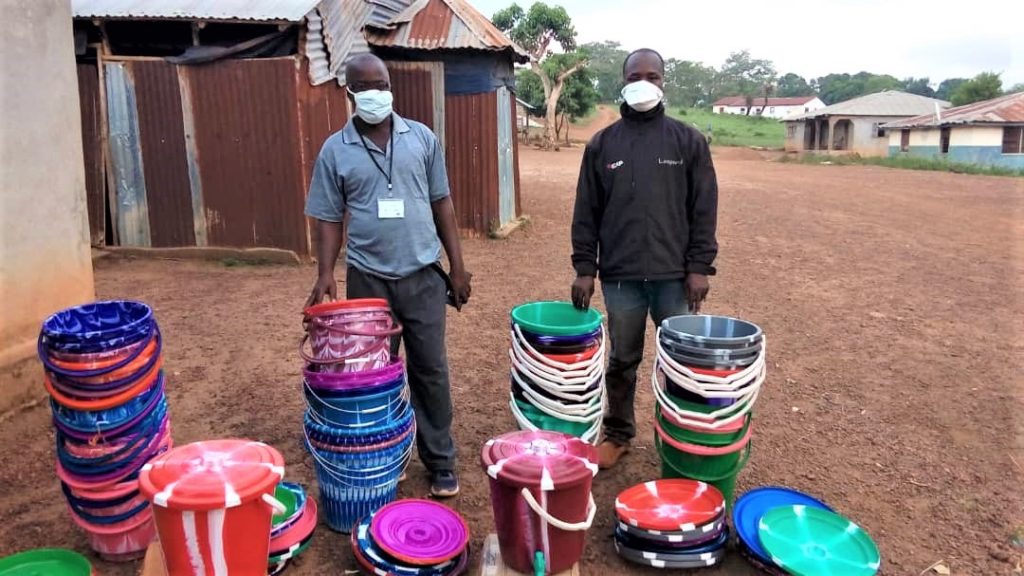
Because of travel constraints in Sierra Leone, we had to wait several weeks until our in-country director was able to collect the last church plant reports available before the country was placed on lockdown and public gatherings were banned.
The results were extremely encouraging, despite the changes that have taken place related to the COVID pandemic. In the months of March and April alone, 13 churches were planted in Sierra Leone! In just those two months, over 3,500 watched the JESUS film, nearly 500 made a public declaration of faith in Christ, and 255 are in follow-up discipleship.
We were especially excited by the fact that two new plants have penetrated even deeper into the unreached Bom tribal District! Pray with us that the follow-up groups will continue strongly, despite some of the challenges faced because of the COVID-19 restrictions and the rainy season. If you have access to Google Earth/Maps online, to get a sense of just how remote these villages are, type in these coordinates on Google to reach the Topain Village location: 7°13’55.51″N 11°56’51.30″W.
Musa Fowundu (see photo) of Topain Village shares: “I watched this film before in Bo Town, but I did not understand it because the translation was English. I love [this] film because of the Mende dialect, I understood everything in the film and I enjoyed every bit of it. The film actually touched my heart because of what was done to Jesus as a result of His sacrifice for us all. Indeed God is actually good to us. It is a fact that we are the ones that are creating problems for ourselves, because we don’t love God and do not want to obey Him at all. Because of this film, I will learn to trust and obey God for the rest of my life because He cares for me, and also because of what He did for me by sending His Son Jesus Christ to come and die for us. I appreciate God tremendously.”
Impactful COVID-19 Engagement!
In the same way 9-11 was a defining moment 20 years ago, COVID-19 is likely to be a defining event in our generation for years to come. On a global level, many people will, in fact, define their world in terms of pre-COVID and post-COVID.
Although on a smaller level then in many other countries, the coronavirus pandemic has still had a dramatic impact on the lives of our workers and communities in the countries where we minister. It required us to be creative in how we adapted the ministry.
In all of the countries that JFCPS and GAIN minister in, our teams and ministry partners have been ideally positioned to adapt to meet the needs of the people in their communities. For the time being, we may not be able to show the JESUS film to large gatherings. However, God has provided the means for our teams to demonstrate God’s love by equipping communities with hand washing stations, hygiene training, and best practices to ensure vulnerable people do not contract COVID (or other diseases). This demonstration of grace has even extended to Muslim and military members of the community.
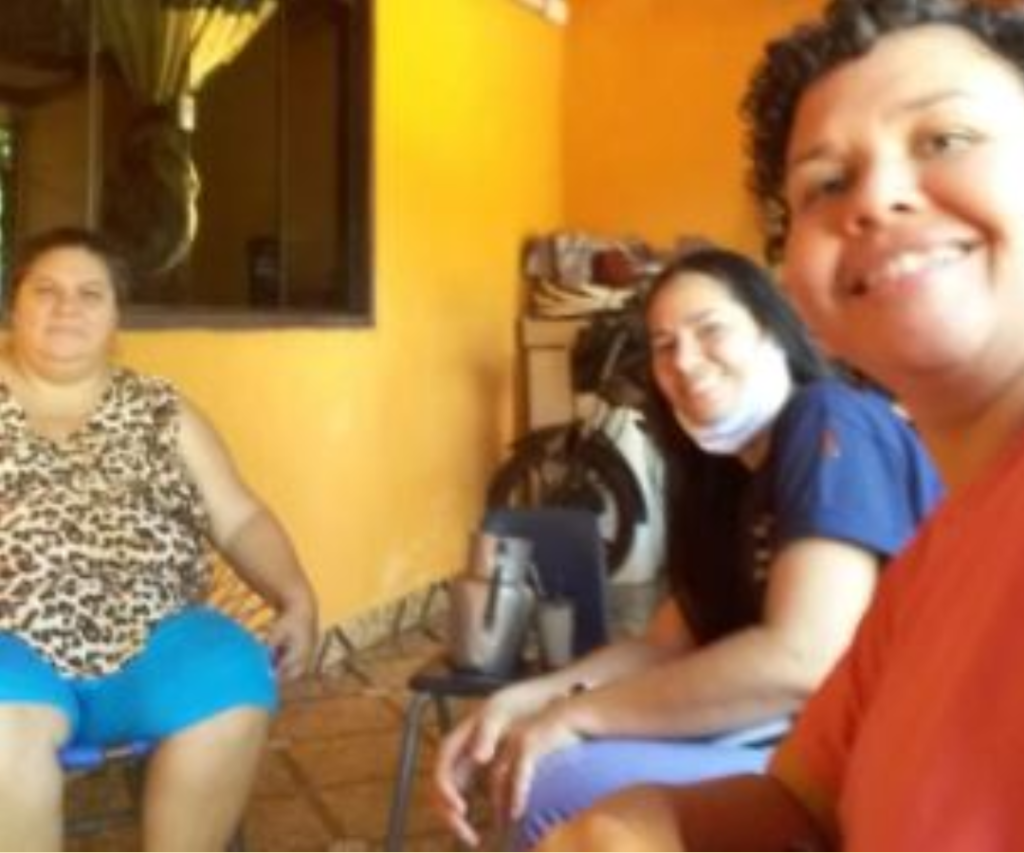
When COVID hit Paraguay, the country’s strict lockdown measures meant that many small businesses suffered, resulting in many families struggling to get enough food to eat each day. As a result, GAiN’s local partners Diaconia and Jesus Responde are running soup kitchens to help.
Margarita R. is a chaplain for Diaconia. She meets with trust groups, specifically to share God’s word, encourage women in the trust groups and pray for them. This was needed more than ever, as a lot of these women were desperate to provide for their families. Below is her story about how she was able to walk alongside a woman who had experienced a series of tragic events.
“I contacted the president of a trust group called San Vincente and asked the leader for permission to visit the soup kitchen so I could pray for her and her family. She accepted without hesitation.
One day, I was visiting a woman named Zunilda and she shared her very painful past. She lost her daughter-in-law in a motorcycle accident, and then three months later, her daughter and her husband also got into an accident, which left her husband fighting for his life. Thankfully, after a long treatment, her daughter recovered completely.
I followed up with Zunilda once a week to pray, encourage her and her family, and share the Word of God with them. The last time that I visited, she told me about a recent tragedy with her nephew. He was hit by a car after chasing a soccer ball that went into the street.
Through text messages, I chatted with her and encouraged her to not distance herself from God, but to rest in Him. I explained how we are able to do this, and every week I continue to pray with her and her daughter. I make sure to continue to share encouraging devotionals with them.
The family was filled with anxious worry about the nephew’s recovery. It’s at times like these that they say they are very thankful for the prayers and support they receive from Diaconia.
I was encouraged when Zunilda told me that she is drawing closer to God again. Thanks to Him, she says, her six-year-old nephew is now much better and has returned home from the hospital.”
Your support has helped provide not just physical nourishment, but emotional and spiritual support for women and families that are struggling during this pandemic. Thank you for helping reveal hope and restore life during these uncertain times. Your help is making a huge impact.
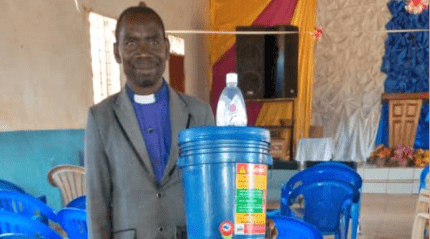
Over the last six months, food insecurity has become an even greater concern in developing countries like Benin, Togo and Tanzania due to the global pandemic. The pastors that we partner with have not been spared the economic consequences, with many of them struggling to put food on the table. Thanks to everyone who supported our COVID response, we were able to provide food to approximately 400 pastors in need, with the last bags of food being provided at the beginning of August.
“This food is going to [feed] a lot of people in my household,” shared Pastor Vivwadinou Edmond from Glo Djitin, Benin. “I have four children, but we have other relatives living with us. We were suffering as a result of the COVID-19 outbreak, but today we are incredibly happy because we have been given some food. We have no other support. God knows that so many pastors are suffering as a result of the COVID-19 crisis. We were totally desperate. We did not know what to do or how the future would look like. We used to get some money at the end of the month; but during this crisis, it is like no months come to their end. Nobody asked how we are managing to survive but God brought us relief.”
Another pastor in Benin, Pastor Adrien Hountekon from Tori Gbohoue, also received help and expressed his gratitude.
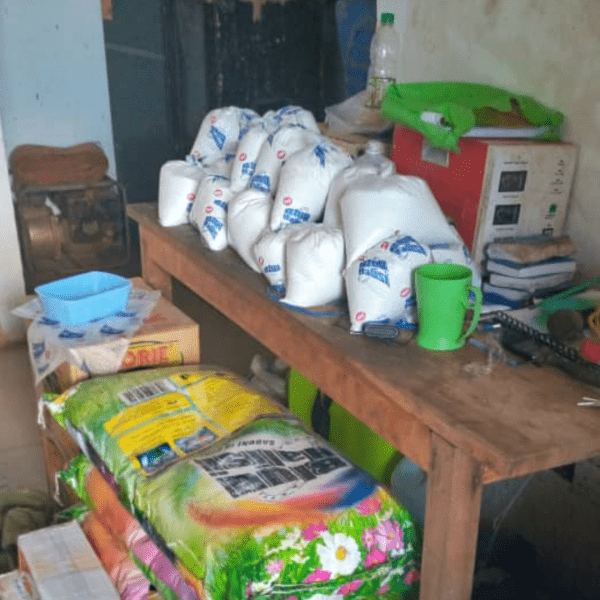
“As a result of COVID-19, churches closed and we pastors are experiencing exceedingly difficult times. Our church members were struggling financially even before the crisis, but as a result of COVID things have become worse. We no more meet for worship services. We attempt to meet in homes but it is difficult. We somehow are trying our best to visit believers in their homes to pray for them or to bring encouragement to them. We all know that it is from what the believers give that pastors are paid and now that we no more hold church services we are in trouble financially. Pastors today lack means to even go and visit church members. Today, I am greatly encouraged as a result of what I have seen and [the food I] received. It has given me energy to continue to work. I have understood that not everybody has forgotten about pastors.”
Thank you for helping reveal hope and restore life to pastors in Benin, Togo and Tanzania. The impact of your support truly goes beyond just providing food. The emotional encouragement of knowing that they are supported and cared for has made a tremendous impact in the lives of pastors who are still working hard in their communities to share the unconditional love of Jesus, and support and encourage their church members during this pandemic.
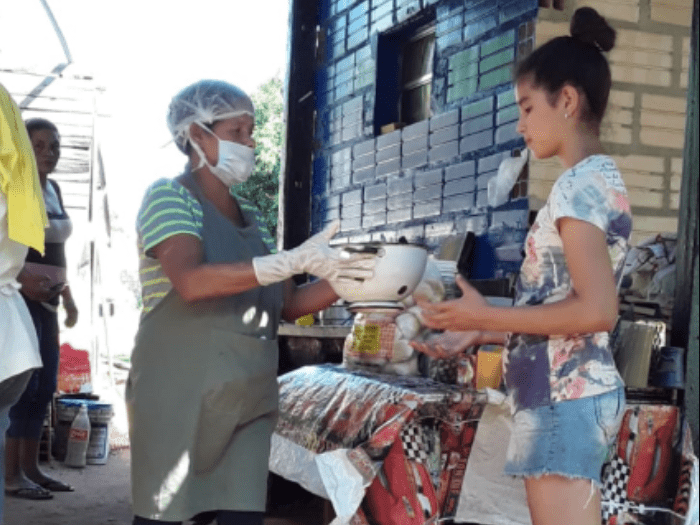
To prevent the spread of COVID-19, the country of Paraguay immediately imposed a strict lockdown and managed to keep their cases low. Unfortunately, this put limitations and restrictions on people’s ability to work, worsening the situation for those already living day-to-day and experiencing food insecurity.
Diaconia, Global Aid Network (GAiN)’s Paraguayan partner, was unable to run trust groups due to a ban on public gatherings. Because of strict curfews and other restrictions, many of their clients’ businesses were impacted.
To help alleviate the stress of food insecurity for their clients’ families and others, Diaconia teamed up with Jesus Responde to run soup kitchens in multiple different communities. There are currently 49 active soup kitchens, reaching over 8,500 people.
Gloria Q., an employee of Diaconia, shared the impact that the soup kitchens are having in the communities, as well as the hearts and sacrifice of the women who are serving.
“I have had the opportunity and great pleasure of being able to spend a morning with several [Diaconia] clients who are running one of the soup kitchens. Having someone visit from the organization brings so much joy to the community and they are always very thankful for the both the material and moral support that they receive from Diaconia.
The women commented happily about their day-to-day experiences cooking for so many people in need. They are in a large squatter village and can’t serve every person but are very thankful to be able to reach so many families.
As they showed me their cooking space, I noticed that they had all of their utensils sanitized and clean and several families had brought firewood so that it would be enough when it came time to cook.
While their cooking space is a bit precarious, the women are not discouraged thanks to their positive attitudes and enthusiasm. They have notebooks where they record the quantity of people that attend every day and a small bank for those who wanted to contribute even the smallest coins to purchase meat for the next day.
Many of them work in recycling and have found themselves out of work temporarily.
Miriam, who is a Diaconía client, and Rosa, who is the owner of the house where they cook, are both Christians and are very grateful for the opportunity to share what God is doing in that place.
Every day, they ask the people attending to form a line where they will retrieve their food and, before serving, they share a Bible verse and pray for the needs that they express at that time.
Now, they don’t even have to ask for prayer requests, the people they serve make sure to remind them that it’s time to pray and most of all they look forward to the time of prayer before the food is served.
Rosa even commented that some people have shown up to leave a small piece of paper that has their prayer requests on the days that the soup kitchen doesn’t serve meals.
These women expressed how God works to not only provide supplies and materials, but also works spiritually and how he can change perspectives and mindsets when families hear His Word. Some, maybe only a few, but not any less important, are conscious that if they have even something small to eat at home, they don’t attend the soup kitchen so that those who need it most are able to eat, despite not having enough for themselves.
Some days, they play games and sing Christian songs with the children that come. If they show up early and the food isn’t ready yet, they take advantage of the time to have some fun with the younger kids. And then, after the meal, they go home even more joyful.
After spending a wonderful morning with the women of this soup kitchen, we had a time of prayer—thanking God for His mercy, asking Him to keep transforming hearts through this activity, and for taking care of each person who is exposed daily to COVID-19.
This was such a beautiful experience for me and filled me with such a feeling of satisfaction and, more importantly, joy. I thank God for each one of the women working in the soup kitchens that each and every day are willing and ready to serve their community without expecting anything in return.”
Global Aid Network (GAiN) sent a DART (Disaster Assistance Response Team) to Lesbos, Greece to spend two months at Camp Moria. One of their projects was to rebuild a structure that had burned down in March 2020. Because of a shortage of volunteers, due to COVID-19, the DART team helped rebuild the structure (called Level Two).
Below is a story written by Melinda, a DART member:
As soon as we start working a crowd of kids starts gathering and wants to help. Men and women walk by, either giving us curious looks or asking in, more or less, broken English what we are doing.
“When is it done?”
“We don’t know. A few weeks.”
A few weeks to rebuild two burnt structures in camp.
The fire happened two months ago and a lot of families lost their shelter. The families that lived inside the two isoboxes but also the families living in self-built structures around it. One child lost its life.
Omar*, a 15 year old boy from Afghanistan lives with his mother and siblings only a few meters down from where the fire happened. He tells me that the fire broke out in the morning. An accident. The mother of the little child was standing in the food line to get breakfast for them when the fire started. Her husband was already in Germany and the two of them on their long journey to reunite with him. But the reunion of the father with his little child will never happen. The little one died in the fire.
Omar also tells me that the fire truck couldn’t even make its way to the location. The paths in camp are too narrow for a big fire truck. Women and children were running away from the fire while men were bringing water to extinguish the flames. It is a miracle that the fire was stopped by buckets of water. The trees standing around still have black trunks.
A few families have already built new structures around the burnt skeleton of an isobox. Even though the land is valuable no one has settled inside the left behind ash-black beams. Local NGOs had to fight for that. Now no family has to be told to remove their shelters while we are rebuilding.
“Do you think it is good that we are rebuilding the isoboxes?”
“Yes!” Omar says. “Then families can move here from the jungle,” as the olive groves around the official camp are called. “That’s good. They will even have a shared bathroom and electricity here.”
Omar helps us today scraping off the bubbled paint and soot off the beams. He’s excited to be able to help and also practice his English with us. During lunch a beautiful woman comes and brings us Afghani pastries. Kids and adults tell us thank you for doing the work and rebuilding.
We feel well taken care of.
“Will you be back tomorrow?”
“Yes, tomorrow and the day after tomorrow and almost every day from now on until this shelter is finished.”
In addition to rebuilding the burnt structure, the DART team also built an isolation station for potential COVID patients to quarantine, in the event of an outbreak at the camp.
Melinda shared a few thoughts just before the station was about to open:
The isolation station from MSF (Doctors Without Borders) is now officially ready to be opened. As we drop off the last few things for the ‘isolation kits’ every patient will get upon arrival, a group of 15 cleaners is roaming around, sweeping up the last sawdust and picking up the last bits and pieces that show that up.
Until today, this place was a full-on construction site. The electricians fix the last light switches, the water tanks get filled with water, the project manager is on the phone and looks tired, stressed, but still content. While all of this happens, medical personnel get their tours in groups of 15, do a walk through from low risk area to high risk area, walk into the changing rooms and take a look at the wash facilities for the future patients. It feels like a buzzing beehive.
Tomorrow is the opening. And while people are excited that everything seems to be done in time, the hope is that this facility will never have to be used. Or at least never to its full capacity. That only very few of the isolation kits will ever be handed out. The paradox of building a corona isolation facility: putting in so much work under time pressure with the hope and prayer that it will never be needed.
“The COVID-19 crisis has been very tough for us,” Pastor Pascal, leader of the Assemblies of God church in Gbegbessa, Benin, shared. “We have lacked food and we have not found anybody to come to our support. Hadn’t we had faith in God, we would have abandoned the ministry. Very few church members would ask to know how we were doing and help. We were abandoned to our own.”
The church was planted back in 2010 as part of Global Aid Network’s (GAiN) water and church planting strategy. Villagers received access to both safe water through a deep-capped water well as well as had an opportunity to hear about Jesus. Pastor Pascal, which was from a church in a nearby village (called a mother church), committed to a long commute to this church plant, so that he could invest time in the new church.
“I did a lot of teaching by myself or through a lay leader and was able to baptize a bunch of people there. I have taken care of the church like [I did with] the mother church, being with them on a regular basis.”
In February 2020, the church started an evangelism program, which resulted in increased church attendance. But when COVID-19 hit not too long after, the country implemented restrictions on public gatherings in groups, meaning that church meetings were no longer permitted. Many churches, including the one in Gbegbessa, had to meet in member homes for shorter periods of time and in smaller groups. Eventually, the church in Gbegbessa decided to stop small house meetings and instead have Pastor Pascal go house to house to visit members’ homes on his own.
GAiN has been connecting with pastors in Benin, Togo, and Tanzania during the pandemic, through calling and texting, to offer support and coaching.
The goal is to provide pastors with the tools to help promote health and encouragement to their communities, bringing knowledge and hope. Pastors help spread the message on how to reduce the spread of the virus, as well as provide care for church members and encourage their members to demonstrate love in their communities.
Government restrictions in response to COVID have also heightened food insecurity in these countries. To help alleviate some of the burden, GAiN is providing one to two months worth of food to pastors and their families (approximately 450 pastors in Benin, 200 in Togo and 40 in Tanzania) as part of the Pastor Support Program. Pastor Pascal is one of those pastors.
“Two weeks ago, I received a call from the GAiN people who wanted us to come for a meeting. I was very glad to hear that because I know these people may want to support us in some way. I started to call them on a regular basis to make sure I don’t miss the opportunity,” Pastor Pascal said.
“As I got to the GAiN office, I noticed bags of rice and am happy because I am sure I am going to bring food back home for children, my wife and myself. We will cook food and rejoice. This food will last for many weeks. Everybody in my household will be very happy.”
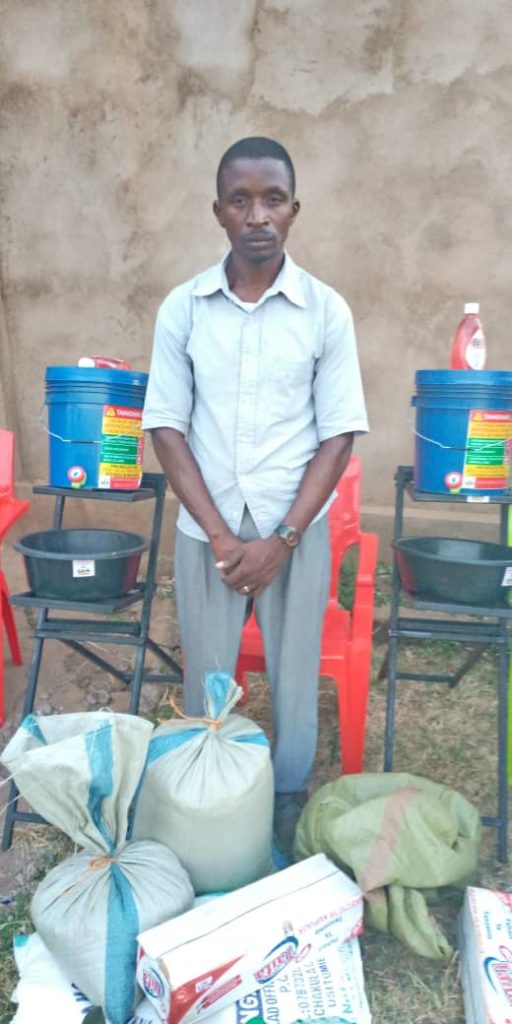
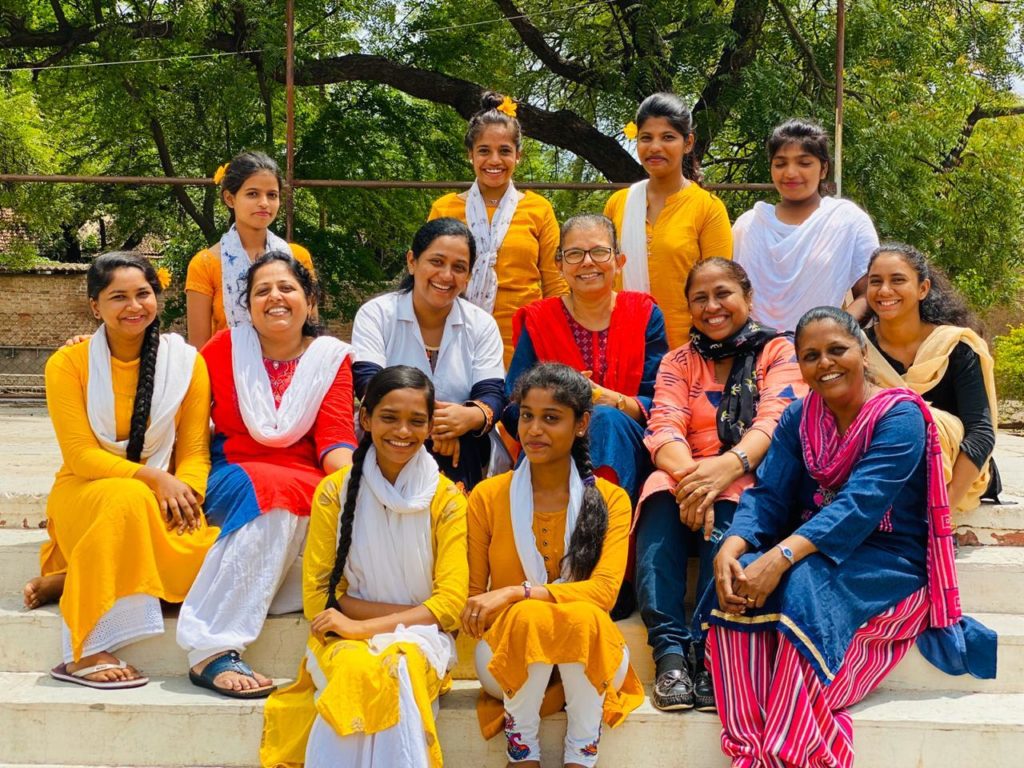
“Therefore if anyone is in Christ, he is a new creation, the old has gone, the new has come!” – 2 Cor. 5:17 (NIV).
Due to the COVID-19 pandemic, India has been under lockdown, restricting the movement of girls and women at Pandita Ramabai Mukti Mission (Mukti). Mukti has been focusing on healing for the community and instilling higher standards of hygiene. They are spending this time in lockdown learning to create, communicate, cooperate and work on new methods toward self-sufficiency.
The flower family girls volunteered to set up kitchen gardens in their family yards, with guidance from the farm staff. Segregation of organic and non-organic waste is done systematically and making their own fertilizer is now a joy and not a burden. The farm staff is committed to the vision of using every patch of land and making it productive.
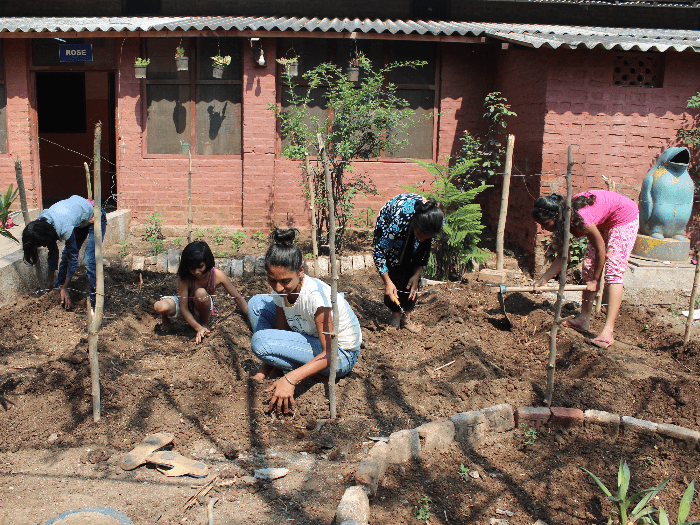
While the girls are keeping busy, being forced to stay at home has been frustrating for them. Being occupied with gardening, cooking and handcrafts hasn’t been enough. Dr. Lorraine Francis, Mukti’s Mission Director, had something in mind for the girls. She took her love and concern to the Lord in prayer and decided to hold a one week camp, from June 15 to June 19, 2020, for the Mukti girls on campus.
Dr. Ajita Kuberji, Dr. Deepika and Dr. Lorraine Francis, were the resource women for the camp. They spoke on the theme of newness in Christ. The young women experienced a fresh visitation from the Lord. Many girls prayerfully made the decision to walk in the newness of Christ, with reverence and in obedience to God’s Word. Many wanted to put away old thinking patterns and behaviors and have a closer relationship with God. The girls gained a better understanding of involving God in every aspect of their lives. Dr. Lorraine Francis also spoke of the importance of maintaining a journal. The girls made a commitment to record their thoughts and burdens in a private journal.
The 104 girls who attended the camp were divided into teams named after birds: Peacock, Dove, Eagle and Parrot. It was a delightful sight to see all these girls dressed beautifully in colours that imitated the plumage of their team birds. Apart from the spiritual sessions, there were also sessions on painting, art and crafts. The happy campers participated in games, cultural activities and even a cooking competition.
The team that organized the camp was keen that girls struggling with emotionally heavy issues be encouraged. The sound of their singing, dancing and joyous laughter was a rich reward for the team’s hard work.
This verse represents Mukti’s prayer and hope for each precious girl who attended the camp “Do not let anyone look down on you because you are young but set an example for believers in speech, in life, in love, and in purity.” – 1 Timothy 4:12 (NIV)
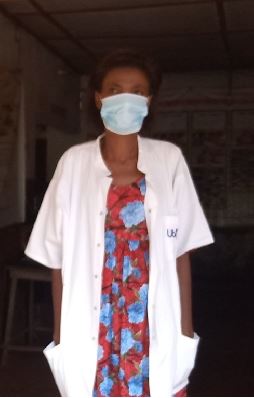
In May of this year, our Water for Life Initiative (WFLI) teams completed the first of three rounds of our COVID response (as of today, our teams have completed three rounds). Teams delivered handwashing stations and soap to community clinics in rural Benin and Togo, to help support clinics with low resources. We also provided personal protective equipment (PPE) and instructions on how to prevent infection. Each clinic received five handwashing stations with soap and water, 100 masks, 100 pairs of gloves, and sanitizer fluid.
Ida Hedje, the supervisor at the clinic CS de Attogon in Benin, told our teams that the new equipment gave her and her colleagues a sense of security because it helps reduce the risk of contamination for themselves and visitors to the clinic.
Silete Henemi, the manager at USP Klologo in Togo said, “This new equipment is going to serve us to protect all the clinic workers. We will also use the mask as protection to our patients and let everybody that is coming to the clinic to wash their hand properly before having access to the clinic.”
“This new equipment will help us to be more protected in our interventions with patients and also help the community practice hygienic measures to fight against COVID-19 contamination,” Kodjovi Niamessi, manager at USP Atovou in Togo, said.
Story and photos by Pau. A. (Written on May 26, 2020)
One of the valuable contributions the DART (Disaster Assistance Response Team) is bringing to camp Moria is additional experienced personnel and good quality equipment. This week, from Monday to Wednesday, we are helping our partner EuroRelief to distribute hygiene packs to 2.000 families.
Most of the hygiene packs were donated by UNICEF. We also have refugee volunteers from Team Humanity to translate and give directions to families, while EuroRelief and GAiN are coordinating the distribution. It’s amazing to see four aid organizations come together for such a necessary thing as it is hygiene inside camp.
While the rest of the team is still working on the construction project, Marie-Jose is probably bringing back memories from the DART mission in Iraq as she is taking care of registering and keeping track of the families being helped during the distribution. Meanwhile, Anais is standing under the hot sun guarding the queue and receiving tickets, while showing unconditional love with her big smile and nice conversations, probably without understanding a word. Moreover, our distribution equipment is making things much easier for dealing with the crowds.
“It’s the first time they give me this,” says Farid*, a young Afghan man who arrived at Moria six months ago with his family, “just once they gave us soap, now they are giving us this box, but I don’t know what’s in there.” Every box includes two 10L collapsible water containers, one bucket, 12 soap bars, a self-powered torch, child potty, multipurpose cloths, reusable menstrual pad kits, sanitary pads, a safety whistle, underwear and laundry detergent.
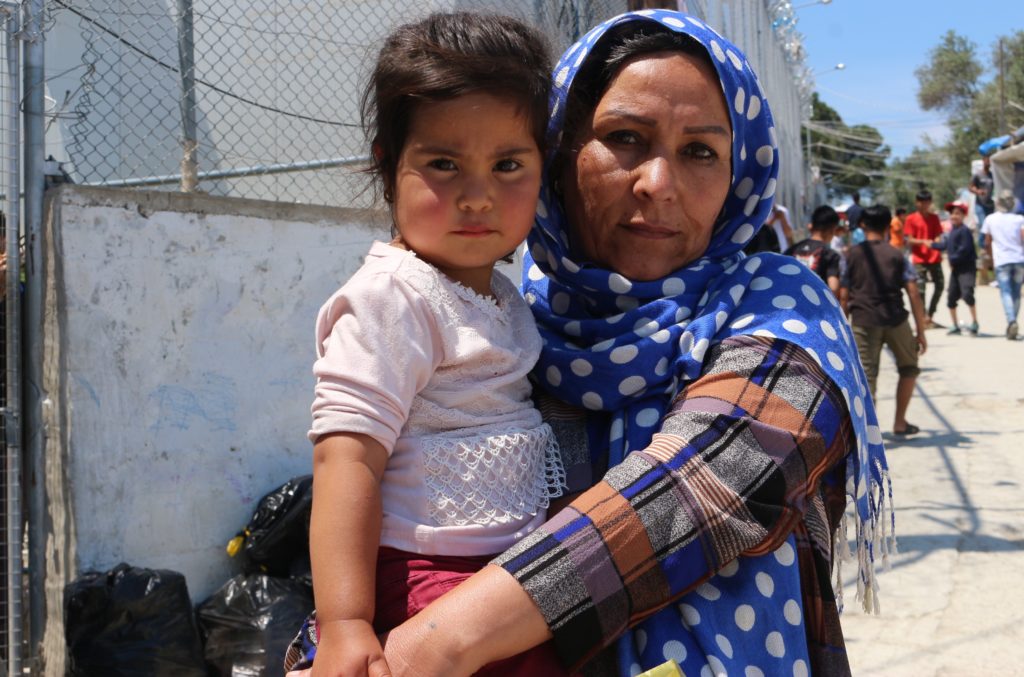
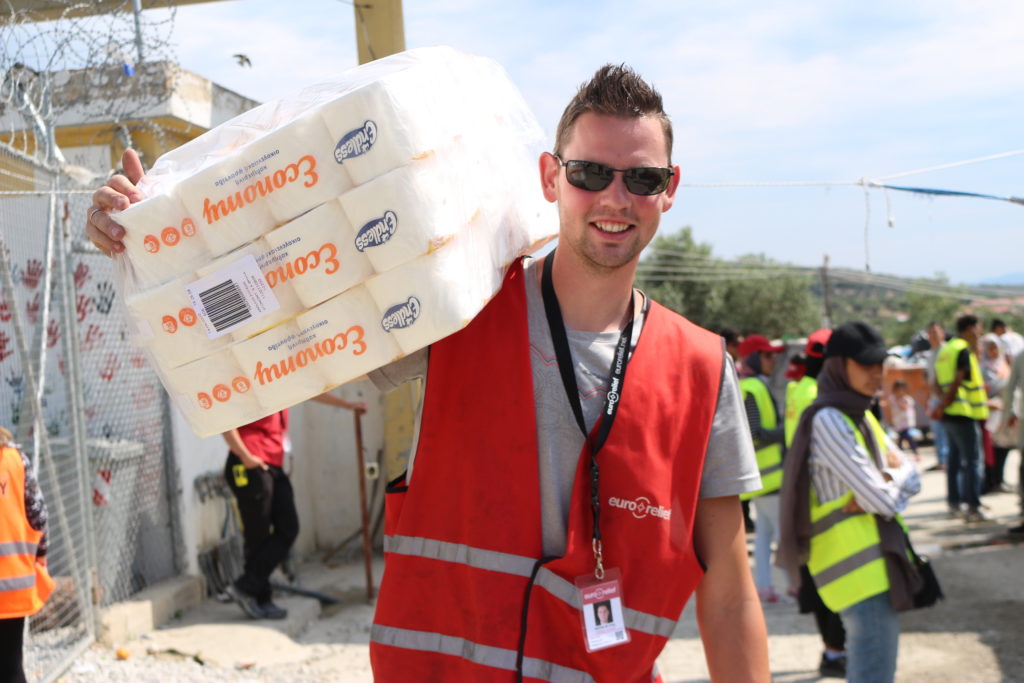
Zahra* is an Afghan woman in her fifties who came five months ago, now living with her husband in a tiny house made of reeds on top of the area called The Jungle. Where she lives “there is no washroom, no facilities, nothing,” therefore they need to walk for a while to reach one. They try to keep clean and take hygiene measures during coronavirus times with the “few” products they have. “Two times they gave us soap,” she recalls, “but the other times we buy it ourselves.” The last time they received soap was “two months ago.”
These families also affirm using only water for washing when they run out of soap and other products. But water is also a big problem inside Moria. “Because now the weather is so hot, every day we should take a shower, but we don’t have (enough) water to do that,” explains Fatimah*, an Afghan teenager raised in Iran who has come to the distribution on behalf of her family. “Because of coronavirus we should wash our hands, but we don’t have water, what should we do?”
Fatimah is so right. Sometimes, Moria camp feels like a never-ending steeplechase race.
*Names changed for security reasons
When India went under a strict lockdown in March, migrant workers were left unable to work when their job sites (like factories) were forced to shut down1. Living on a daily wage, many felt they had no choice but to return to their homes, often hundreds or thousands of kilometres away, in rural areas. For those unable to get transportation, they’ve been forced to return home on foot. This has led to over 100 deaths and even more injuries, either from accidents or exhaustion2.
Pandita Ramabai Mukti Mission has been involved in outreach to migrant workers, providing over 460 food packets to families in need. Below is a story from Mukti:
There are many heartbreaking stories among the migrant workers. As my residence is facing the state highway, most of the time, I see broken families. Having packed their scanty belongings, they make their way back to their own state. I saw a couple, with the wife balancing a little infant on her hip, and a bundle of clothes on her head. The husband had another bag on his shoulder and a toddler holding his hand. With tears rolling down their cheeks, they had been walking on foot, not knowing when they would reach their destination.
Some of these families have to travel thousands of kilometres to reach their hometown. The migrant workers with whom Mukti is associated are so grateful that Mukti has spared their lives, saving them from having to sleep under the railway tracks with their families.
“Thank you Mukti Mission for coming to our aid. We would have done a foolish thing by making a decision to leave Kedgaon!” one family shared. “From the feedback we have received from our friends who left their workplace and took the risk of going home, are now in very bad shape. Most of them suffered from all kinds of illness on the way. Some died and others are on the way to die. Those who have managed to reach their destination through difficulties are not allowed to live in the village. Their hometown neighbours and friends are not willing to take the risk of accepting them back. Hence, in other words, they are neither here nor there. This is the plight of migrant workers all over India. Praise God for Mukti Mission who stretched forth their hand of love, kindness and generosity which we will forever be indebted to. In no way, we can repay you for what you have been doing for us, but we know that there is a God who will reward you.”
Would you partner with us to help reveal hope and restore life through our COVID Response?
Together, we can help communities slow the spread of the virus, as well as provide necessities like food.

